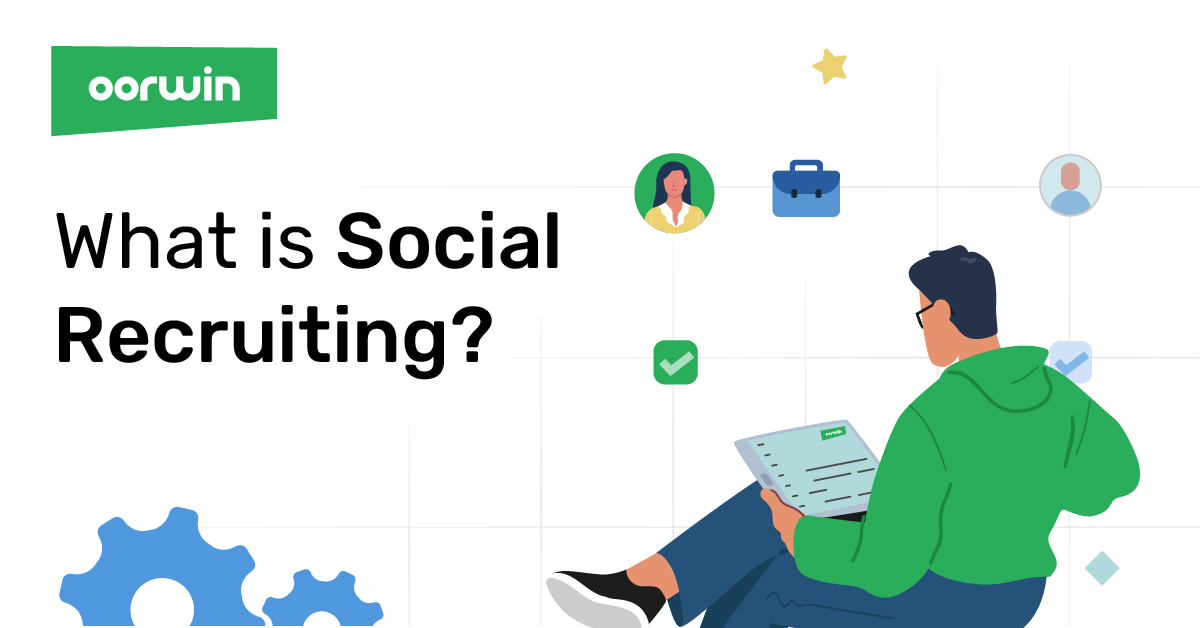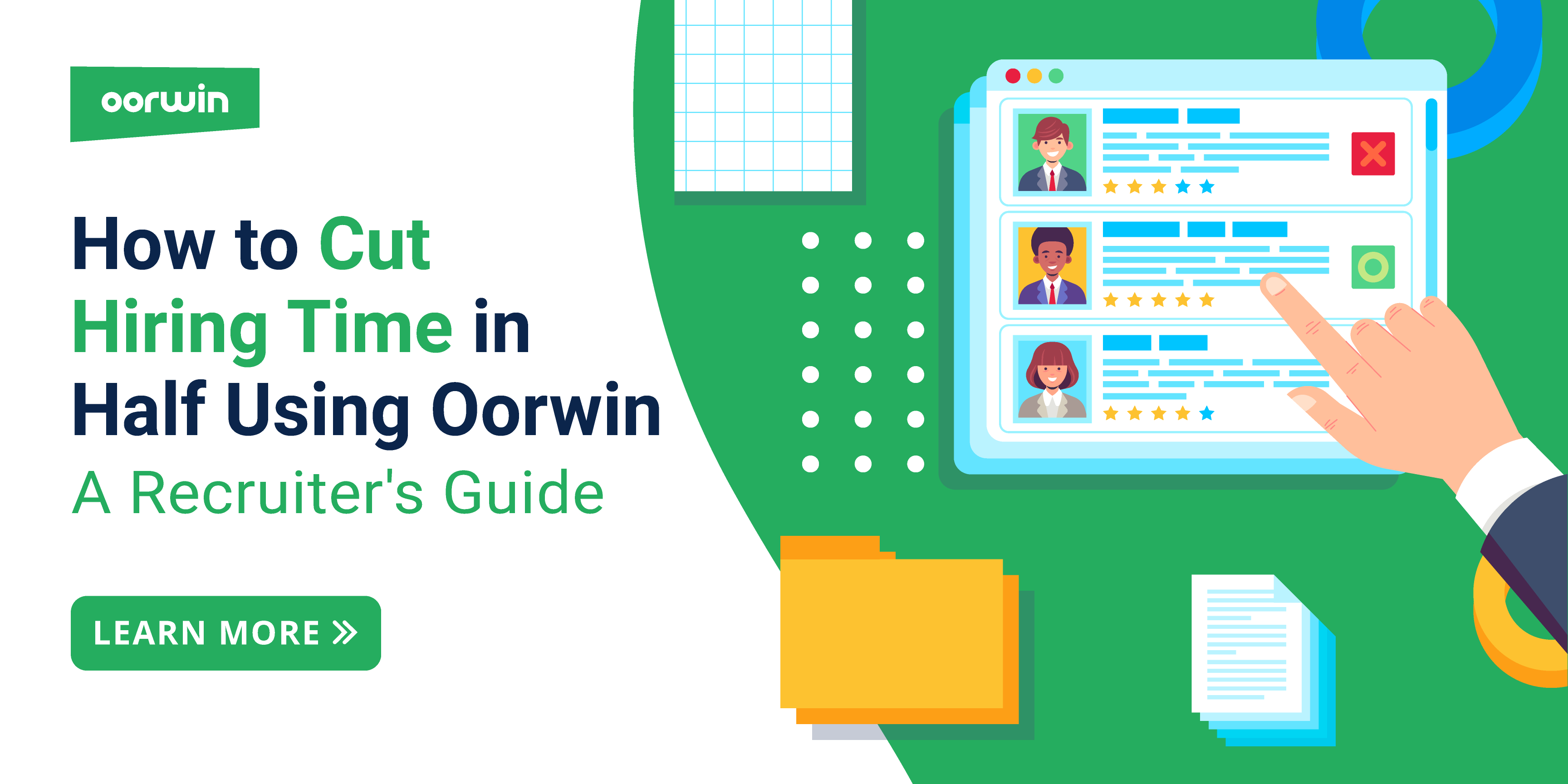What is Social Recruiting?
Oorwin
4min read / 24 Jul 2022

Related Articles
The Ultimate Guide To Social Media Recruiting
Social media is a great way to interact with friends and family. But it is also a valuable recruiting tool. In fact, 92% of employers comb through social media platforms to find new employees. As social media platforms have become more popular for recruitment, recruiters are finding it an effective way to get their jobs in front of more candidates. This allows them to explore new recruitment avenues.
Are you ready to get social? Let’s look at the power of social media recruiting, and discover how leveraging a talent intelligence platform can take your social recruitment efforts to the next level.
What is Social Media Recruiting?
Social recruiting is the process of sourcing or recruiting candidates through social media platforms like Facebook, Twitter, LinkedIn, etc. This talent acquisition strategy treats social media profiles like talent ads or databases. Social recruiting is also known as social hiring, social recruitment, or social media recruitment.
In recent years, this modern recruitment strategy has gained popularity among recruiters and job-seekers:
- 56% of job seekers and 60% of recruiters use professional social media networks.
- 62% of job seekers use social media channels to evaluate the employer brand of a company
- 49% of professionals are following companies on social media with the intent to stay aware of their jobs.
The Importance of Social Media Recruitment In 2023
Using social media to get a new job has grown steadily for more than ten years. In fact, according to Glassdoor, 79 percent of job searchers utilize social media for their job search.
More than 84 percent of businesses use social media for recruiting, and another 9 percent plan to if they haven’t already.
1. Social Posts Improve the Visibility of Your Job Listing
Your job postings will undoubtedly attract eligible applicants, from those actively seeking employment to those lazily perusing their social media feeds.
2. Millennials are Already using Social Media to Look for Jobs
People utilise social media in the billions. Your job postings will undoubtedly attract eligible applicants, from those actively seeking employment to those lazily perusing their social media feeds.
3. Interaction on Social Media Platforms Boosts Brand Awareness
It’s probable that some prospects have never heard of your business. Your brand’s visibility and reputation can be enhanced by networking with those candidates and posting on social media.
What Are the Benefits of Leveraging Social Media for Recruitment?
Social media recruiting is an excellent way to expand your search beyond traditional job boards. Social media’s ease of use and popularity also makes it easy for your followers to share open positions with their networks. It also is a great way to increase your company’s visibility and emphasize your company culture via photos, videos, or employee interviews. Social recruitment has several other benefits for recruiters:
- It allows you to reach passive candidates who aren’t active on job boards.
- You can establish a personal connection with candidates.
- Easily share information about your organization and current job openings.
- Source targeted candidates with lesser cost and faster time when compared to traditional methods (like TV, newspapers, radio ads, etc.).
- Lower your recruiting costs. Social recruiting is incredibly cost-effective when compared with traditional recruiting methods.
- Traditional hiring techniques take more time than social media hiring techniques. This means that social media is the medium to consider when you have an open position that needs to be filled as soon as feasible.
- They can see more about the potential hires on social media. By learning about the person’s personality, they can learn about their goals and what to anticipate from them after they hire them to work for their company.
10 Best Practices for Social Media Recruiting
Every company decides on its own social media recruitment strategy based on its employment requirements. But, here are a few best practices that will ensure you are maximizing your social recruiting strategy:
- It is crucial to establish a strong online presence that communicates the company’s goal and values because millennials and Generation Z look for information online. Because millennials value emotional connection, don’t just provide data.
- Even if it’s advantageous to be welcoming to everyone, you should focus on the proper demographics if you want to advance your plan. As a result, make sure that all of your social media pages are industry-specific, and focus on networking with influencers in your business.
- Implement various types of content on different platforms. For example, Instagram is ideal for employer branding videos, while LinkedIn is ideal for polls.
- Highlight company culture through your posts.
- Research where your ideal candidates spend time and energy. What are their hobbies and interests? This will help you relate to candidates and show that you care.
- Encourage your employees to give referrals and share the opportunities in their networks.
- Monitor and optimize your social media platforms regularly.
- Consistently post on social media platforms to engage your potential candidates.
- When organic efforts don’t produce the desired results, paid advertising is required because most social media sites let users utilise it to spread their message further.
- Create postings that are legible on all types of devices to advance your mobile recruiting strategies. Add social media-optimized images as well.

What are the Top Social Media Platforms for Recruitment?
There are many social media platforms in today’s market. But it is of utmost importance that you choose the right platform to attract job seekers and find the right candidates.
1. LinkedIn
The most widely used social networking platform for hiring is LinkedIn. The website is equipped with capabilities that make posting jobs and receiving resumes exceedingly simple because it was created with professional networking in mind.. Since it was the first professional social network, LinkedIn provides a comprehensive perspective of a candidate’s professional background. Additionally, it offers information on their preferences, recommendations, and hobbies.
2. Facebook
Despite not being a specifically designed professional network like LinkedIn, Facebook’s sheer scale makes it an invaluable tool for recruiters. It offers a variety of opportunities to locate and contact with prospects, and its informal atmosphere can reveal something about someone’s personality outside of work. It includes a job board as well.
3. Instagram
The majority of the workforce, millennials, and Generation Z are enormous fans of Instagram’s visual approach. Despite being widely used, less than 10% of recruiters use this social recruiting channel, which creates a significant early mover advantage.
4. Twitter
Twitter is known for being succinct and to the point because of its character restriction of 280. Though Twitter has emerged as a trusted source for news and events, its shortness isn’t necessarily a bad thing. Twitter is used by everyone to interact with individuals around the world, from famous people to large corporations.
5. Forums
Several forums can be beneficial for interacting with a talent pool and conducting social recruiting. Popular forums like Quora, Stackoverflow, Github, and Glassdoor are helpful resources for social recruiting.
While Twitter, Instagram, and Facebook are great platforms for social recruiting. But career-focused platform LinkedIn is the clear winner. With more than 830 million members and 50 million people searching for open jobs weekly, LinkedIn is a fantastic resource for social recruitment.
How can a Talent Intelligence Platform help with social recruiting?
Artificial intelligence (AI) and machine learning (MI) offer many ways to expedite the social recruiting process, including AI-candidate search, resume harvesting, and identifying passive candidates. But a talent intelligence platform can also help with social recruiting. Here’s how:
- Easily integrate with LinkedIn and other social media platforms.
- Advanced search capabilities store and organize candidate contact information from social profiles quickly.
- Automated communication tools to keep candidates in the loop every step of the way.
Popular Articles..
Blog

2min read / 25-Jun-2025
Master Effective Interview Techniques with Oorwin: A Step-by-Step Recruiter’s Guide
Blog
Blog
Get the latest Oorwin releases, updates, success stories & industry news
 Back
Back
